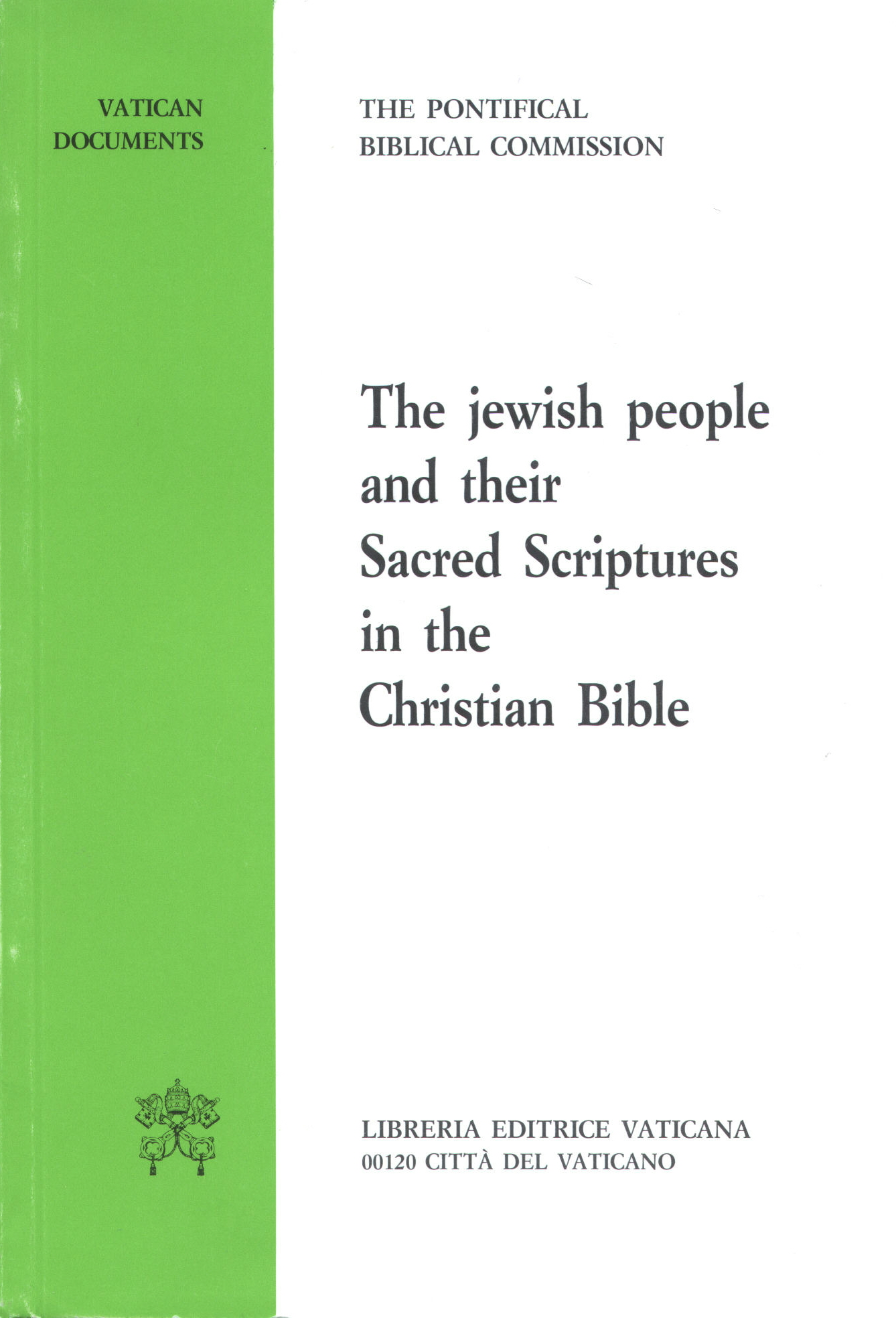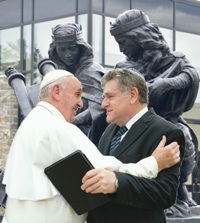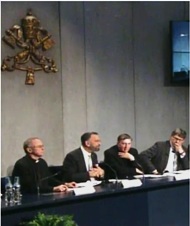| Date | Event | Quotation(s) | Significance for "Gifts and Calling" | |
| John Paul II's Western Wall Prayer: A Commitment to Genuine Brotherhood | ||||
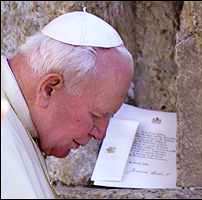 |
March 12 and March 26, 2000 |
Saint John Paul II prays at Saint Peter's Basilica in Rome and at the Western Wall in Jerusalem for rapprochement between Catholics and Jews. |
"God of our fathers, you chose Abraham and his descendants to bring Your name to the nations: we are deeply saddened by the behavior of those who in the course of history have caused these children of Yours to suffer, and asking Your forgiveness we wish to commit ourselves to genuine brotherhood with the people of the Covenant." |
Catholic-Jewish rapprochement had been a priority of John Paul's then 22-year pontificate. His millennial prayer expressed both remorse for the past and a pledge for the future. The moment iconically epitomized all his relevant writings, as in referring to Jews as "the people of the Covenant," a recurrent motif of his. He first used such covenantal language in Mainz, West Germany on Nov 17, 1980, when he spoke of Jews as "the people of God of the Old Covenant, never revoked by God [cf. Rom. 11:29]," citing the Pauline verse that would later provide both the main title and theological foundation of "Gifts and Calling." |
| Dominus Iesus and the Special Status of Judaism | ||||
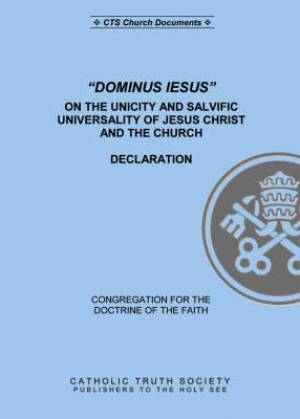 |
August 6, 2000 | The Congregation for the Doctrine of the Faith issues "Dominus Iesus: Declaration on the Unicity and Salvific Universality of Jesus Christ and the Church." It speaks about non-Christian religions without noting the special standing that Judaism has in Catholic thought. |
"For this reason, the distinction between theological faith and belief in the other religions, must be firmly held. ... This distinction is not always borne in mind in current theological reflection. Thus, theological faith (the acceptance of the truth revealed by the One and Triune God) is often identified with belief in other religions, which is religious experience still in search of the absolute truth and still lacking assent to God who reveals himself" (§7).
|
By not stating that Judaism was based on divine revelation, Dominus Iesus implied it was not a true "faith." Catholic leaders soon offered important clarifications that informed "Gifts and Calling," Part 2: "The Special Theological Status of Jewish-Catholic Dialogue":
|
| "With respect to the way in which the salvific grace of God—which is always given by means of Christ in the Spirit and has a mysterious relationship to the Church—comes to individual non-Christians, the Second Vatican Council limited itself to the statement that God bestows it 'in ways known to himself.' Theologians are seeking to understand this question more fully. Their work is to be encouraged, since it is certainly useful for understanding better God's salvific plan and the ways in which it is accomplished" (§21). |
This thought-provoking paragraph is echoed by "Gifts and Calling," §36: "From the Christian confession that there can be only one path to salvation, however, it does not in any way follow that the Jews are excluded from God’s salvation because they do not believe in Jesus Christ as the Messiah of Israel and the Son of God. ... That the Jews are participants in God’s salvation is theologically unquestionable, but how that can be possible without confessing Christ explicitly, is and remains an unfathomable divine mystery." |
|||
| The Jewish People and Their Sacred Scriptures in the Christian Bible: Analogous Rereadings of Israel's Scriptures | ||||
|
|
May 24, 2001 | The Pontifical Biblical Commission releases a book-length study on the question: "What relations does the Christian Bible establish between Christians and the Jewish people?" | "Although the Christian reader is aware that the internal dynamism of the Old Testament finds its goal in Jesus, this is a retrospective perception whose point of departure is not in the text as such, but in the events of the New Testament proclaimed by the apostolic preaching. ... Christians can and ought to admit that the Jewish reading of the Bible is a possible one, in continuity with the Jewish Sacred Scriptures from the Second Temple period, a reading analogous to the Christian reading which developed in parallel fashion. Each of these two readings is part of the vision of each respective faith of which it is a product and an expression" (§§21-22). |
Perhaps its most notable sections are §§21 and 22, which describe Jewish and Christian interpretations of Israel's scriptures as retrospective re-readings that are analogous and parallel to one another. This perspective informs "Gifts and Calling," §31: "[There developed] two new ways of reading Scripture, namely the Christological exegesis of the Christians and the rabbinical exegesis of that form of Judaism that developed historically. ... After centuries of opposing positions it has been the duty of Jewish-Catholic dialogue to bring these two new ways of reading the Biblical writings into dialogue with one another in order to perceive the 'rich complementarity' where it exists and 'to help one another to mine the riches of God’s word' (Evangelii Gaudium, §249)". |
| "Reflections on Covenant and Mission": No Catholic Conversionary Missions to Jews |
||||
|
Cardinal William Keeler and Rabbi Joel Zaiman, co-chairs of the BCEIA-NCS consultation. |
August 12, 2002 | The official dialogue of the U.S. Bishops' Committee on Ecumenical and Interreligious Affairs and National Council of Synagogues issues a dialogue document on why the Catholic Church doesn't seek to convert Jews as some other Christian groups do. It elicits both praise and criticism. | "A deepening Catholic appreciation of the eternal covenant between God and the Jewish people, together with a recognition of a divinely-given mission to Jews to witness to God's faithful love, lead to the conclusion that campaigns that target Jews for conversion to Christianity are no longer theologically acceptable in the Catholic Church." | The most prominent critic was Cardinal Avery Dulles who argued that the Second Vatican Council, "left open the question whether the Old Covenant remains in force today." Over the next several years, Cardinal Walter Kasper, President of the Commission of the Holy See for Religious Relations with the Jews, would insist that "because as Christians we know that God's covenant with Israel by God's faithfulness is not broken (Rom 11:29; cf. 9:4), mission understood as call to conversion from idolatry to the living and true God (1 Th 1:9) does not apply and cannot be applied to Jews. ... This is not a merely abstract theological affirmation, but an affirmation that has concrete and tangible consequences such as the fact that there is no organized Catholic missionary activity towards Jews as is for all other non-Christian religions." (Cf. G&C, §40.) |
| Benedict XVI: Constructive Theology Amid Controversy, 2005-2013 | ||||
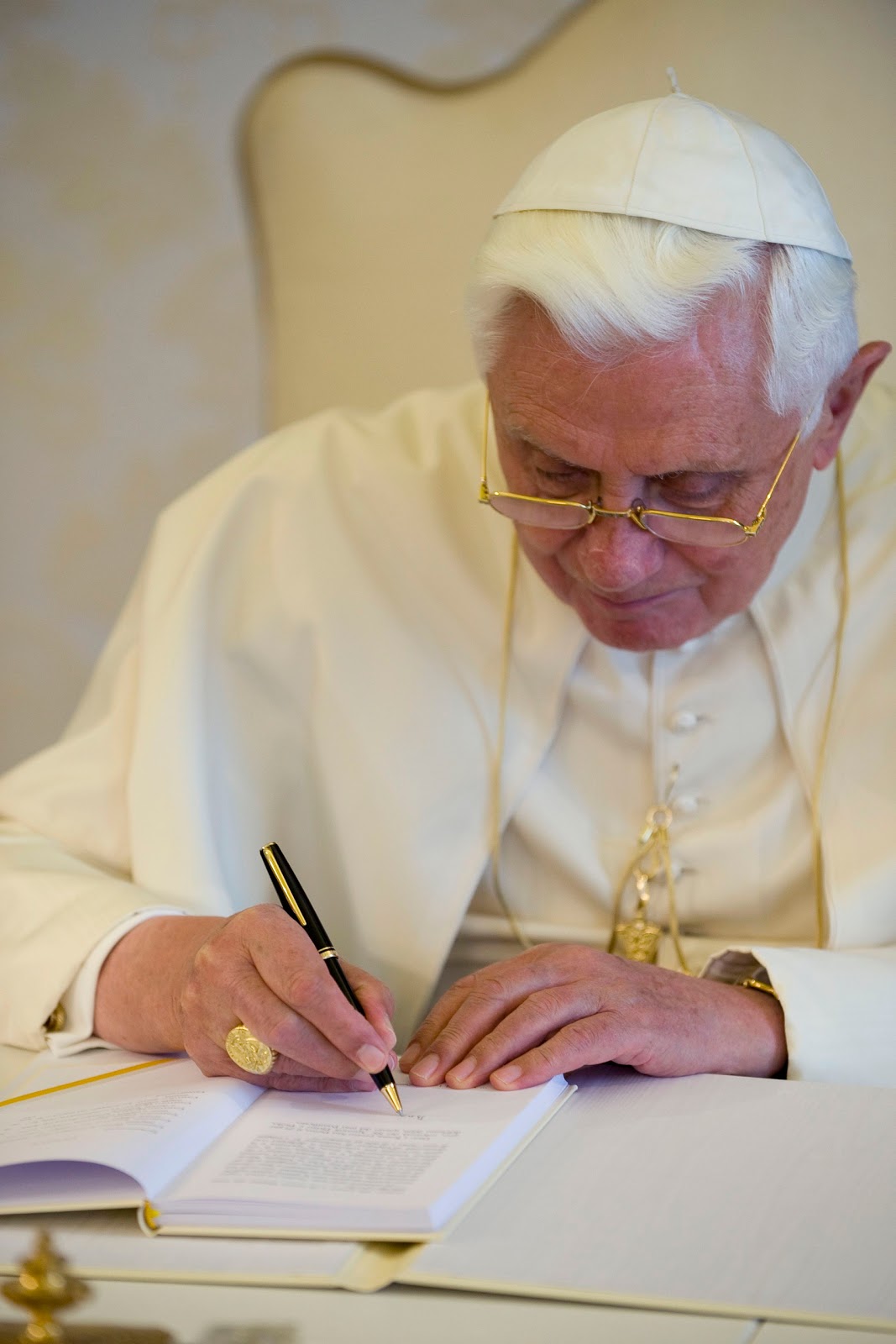 |
February 5, 2008 | The Vatican issues a revised form of the traditional Good Friday intercession for Jews, composed by Pope Benedict for use in the Tridentine Rite. It removed the polemics of the prior version. This was part of his outreach to Catholics who preferred the pre-Vatican II liturgy, including the schismatic Priestly Society of St. Pius X (SSPX), |
[Pro conversione Iudaeorum]
"Let us also pray for the Jews. May the Lord our God illuminate their hearts so that they may recognize Jesus Christ as savior of all men.
"Let us pray: Almighty and everlasting God, you who want all men to be saved and to gain knowledge of the Truth, kindly allow that, as the fullness of peoples enter into your Church, all of Israel may be saved." |
Seen as contrary to the post-Vatican II prayer and as potentially reviving efforts to baptize Jews, the new prayer was widely criticized (see this German analysis). At the pope's request, an essay by Cardinal Kasper was printed in the Vatican newspaper, saying: "In this prayer the Church does not take it upon herself to orchestrate the realization of the unfathomable mystery. She cannot do so. Instead, she lays the when and the how entirely in God's hands. God alone can bring about the Kingdom of God in which the whole of Israel is saved and eschatological peace is bestowed on the world." In 2011, Kasper's successor Cardinal Kurt Koch in a lecture to the Council of Centers on Jewish-Christian Relations, used the words "unfathomable mystery" in another context, stating that "the Jews are participants in God’s salvation is theologically unquestionable, but how that can be possible without confessing Christ explicitly, is and remains an unfathomable divine mystery," a sentence repeated in "Gifts and Calling," §36. |
| January 21, 2009 | The Vatican announces that as a gesture of good will Pope Benedict has lifted the earlier excommunications of four SSPX bishops, unaware that one of them is a Holocaust denier. A public firestorm erupts. On March 10, the pope writes a letter to all Catholic bishops to express his dismay. | "A gesture of reconciliation with an ecclesial group engaged in a process of separation ... turned into its very antithesis: an apparent step backwards with regard to all the steps of reconciliation between Christians and Jews taken since the Council—steps which my own work as a theologian had sought from the beginning to take part in and support." | For months after, Benedict repeatedly condemned Holocaust denial. Over the next few years there were contrasting reports on the ongoing negotiations between the Vatican and the SSPX. In 2013, Cardinal Koch insisted that "The Jews are our elder brothers: particularly in Benedict XVI’s vision of the unity of the two Testaments, we are inextricably linked with the Jews. This point is clear even in the light of the Council Declaration Nostra Aetate. There is no doubt in the Catholic Church that this Declaration is still valid today. It is rejected only by a small group, the [SSPX], who are opposed to ecumenical dialogue, relations with the Jews and religious freedom. The latter are actually key points in the Magisterium of the Holy Father, and if a group does not accept the Council or the Magisterium, it should ask itself whether it is Catholic." | |
| March 10, 2011 | The publication of Pope Benedict's Jesus of Nazareth Part Two, Holy Week: From the entrance into Jerusalem to the Resurrection. On pp. 41-47, he addresses Christian efforts to convert Jews and ... | "[T]he question of Israel's mission has always been present in the background. We realize today with horror how many misunderstandings with grave consequences have weighed down our history. Yet a new reflection can acknowledge that the beginnings of a correct understanding have always been there, waiting to be rediscovered, however deep the shadows. ... Hildegard Brem comments ... as follows: 'In the light of Romans 11:25, the Church must not concern herself with the conversion of the Jews, since she must wait for the time fixed for this by God, until the full number of the Gentiles come in (Rom 11:25).' ... In the meantime, Israel retains its own mission. Israel is in the hands of God, who will save it 'as a whole' at the proper time, when the number of the Gentiles is complete." |
Although "Gifts and Calling" does not allude to the eschatology of these papal words (though see §26), it does in §40 incorporate the related ideas originally written by Cardinal Kasper and repeated by Cardinal Koch: "The Church is therefore obliged to view evangelization to Jews, who believe in the one God, in a different manner from that to people of other religions and world views. In concrete terms this means that the Catholic Church neither conducts nor supports any specific institutional mission work directed towards Jews." [Also echoing the cardinals' prior statements, "Gifts and Calling," §40 goes on to say, "While there is a principled rejection of an institutional Jewish mission, Christians are nonetheless called to bear witness to their faith in Jesus Christ also to Jews, although they should do so in a humble and sensitive manner, acknowledging that Jews are bearers of God’s Word, and particularly in view of the great tragedy of the Shoah." This has raised the question for some commentators as to whether humble and sensitive Christian witness to Jews today might mask an unspoken desire for their conversion.] |
|
| ... on p. 35, Jewish and Christian modes of interpreting the Bible. |
"There are two possible responses [to how to read Israel's scriptures after the destruction of the Temple:] the reading in the light of Christ, based on the Prophets, and the rabbinical reading. ... After centuries of antagonism, we now see it as our task to bring these two ways of rereading the biblical texts — the Christian way and the Jewish way — into dialogue with one another, if we are to understand God's will and his word aright." | Pope Benedict's thoughts on this subject were indebted to the PBC 2001 study, The Jewish People and Their Sacred Scripture in the Christian Bible, §§21 and 22. His words are paraphrased without direct citation in "Gifts and Calling," §31. | ||
| Pope Francis: Sharing a Rich Complementarity as Friends | ||||
|
Pope Francis and longtime friend, fellow Argentine, Rabbi Abraham Skorka. |
January 24, 2014 | Pope Francis issues the Apostolic Exhortation Evangelii Gaudium. In §§247-249, he summarizes many post-Nostra Aetate developments in Vatican teaching, stressing the journey of friendship of the two communities. | "Dialogue and friendship with the children of Israel are part of the life of Jesus’ disciples. ... While it is true that certain Christian beliefs are unacceptable to Judaism, and that the Church cannot refrain from proclaiming Jesus as Lord and Messiah, there exists as well a rich complementarity which allows us to read the texts of the Hebrew Scriptures together and to help one another to mine the riches of God’s word." |
"Gifts and Calling" repeatedly refers to friendship between Catholics and Jews. That friendship is now stable and allows them to address crises and controversies (§§2,10), it "represents a firm foundation for the future" (§11), it enables them to enrich each other theologically, (§13), and it strongly impels the Church to combat antisemitism (§47). The "rich complementarity" between Jews and Christians is quoted in G&C, §§ 13, 31. |
| June 30, 2015 | Pope Francis addresses the International Council of Christians and Jews, noting that the "Holy Spirit has accompanied our efforts in dialogue" and that God's Word speaks to both communities. | "The Christian confessions find their unity in Christ; Judaism finds its unity in the Torah. Christians believe that Jesus Christ is the Word of God made flesh in the world; for Jews the Word of God is present above all in the Torah. Both faith traditions find their foundation in the One God, the God of the Covenant, who reveals himself through his Word. In seeking a right attitude towards God, Christians turn to Christ as the fount of new life, and Jews to the teaching of the Torah." |
The pope's words are directly quoted in "Gifts and Calling," §24, which goes on to the describe Jewish covenantal life in salvific terms (see italics added below): "God revealed himself in his Word, so that it may be understood by humanity in actual historical situations. This Word invites all people to respond. If their responses are in accord with the Word of God they stand in right relationship with him. For Jews this Word can be learned through the Torah and the traditions based on it. The Torah is the instruction for a successful life in right relationship with God. Whoever observes the Torah has life in its fullness (cf. Pirqe Avot II, 7). By observing the Torah the Jew receives a share in communion with God." |
|
| Commission of the Holy See for Religious Relations with the Jews Marks 50th Jubilee of Nostra Aetate | ||||
|
Rev. Norbert Hofmann, Rabbi David Rosen, Cardinal Kurt Koch, Dr. Edward Kessler |
December 10, 2015 | At a press briefing issuing "Gifts and Calling," Cardinal Koch and Commission Secretary Fr. Norbert Hofmann, are joined by Jewish consultants, Dr. Edward Kessler and Rabbi David Rosen. | "The following reflections aim at looking back with gratitude on all that has been achieved over the last decades in the Jewish–Catholic relationship, providing at the same time a new stimulus for the future. Stressing ... the unique status of this relationship, ... theological questions are further discussed, such as the relevance of revelation, the relationship between the Old and the New Covenant, the relationship between the universality of salvation in Jesus Christ and the affirmation that the covenant of God with Israel has never been revoked, and the Church’s mandate to evangelize in relation to Judaism." | In his introductory remarks, Fr. Hofmann stated that the Commission wanted to "ensure that the Catholic-Jewish dialogue acquires greater depth and breadth from the theological point of view." He indicated that "Gifts and Calling" was "aimed primarily at those who are active in this dialogue," especially "Catholic theologians engaged for a long time in Jewish-Catholic dialogue [who] will take in and further develop the reflections contained in the document." He observed that it had proven impossible to compose a similar text for the fortieth anniversary of Nostra Aetate in 2005, but "that it was better to have waited until today because the theological issues in the current document have been intensely discussed in detail especially over the last ten years." |
Analyses
- Philip A. Cunningham
- Analyses of Documents and Statements
The Context of "Gifts and Calling": Chart of Selected Events in Catholic-Jewish Dialogue, 2000-2015
The following chart attempts to survey some of the noteworthy events in Catholic-Jewish relations and specific ecclesiastical exchanges that occurred within the Catholic community between 2000 and 2015. Those fifteen years form the immediate background for the 2015 document of the Commission of the Holy See for Religious Relations with the Jews, "'The Gifts and the Calling of God Are Irrevocable' (Rom 11:29): A Reflection on Theological Questions Pertaining to Catholic-Jewish Relations on the Occasion of the 50th Anniversary of Nostra Aetate (no. 4)." Those years shaped the topics it considers and much of the phraseology it employs. Since many of the relevant theological subjects are tightly interwoven, it is impossible for a streamlined chart to be exhaustive, but hopefully it will convey the principal developments and trajectories of thought that contributed to the most theologically substantive Catholic ecclesial statement to date on the subject of Christian-Jewish relations.


